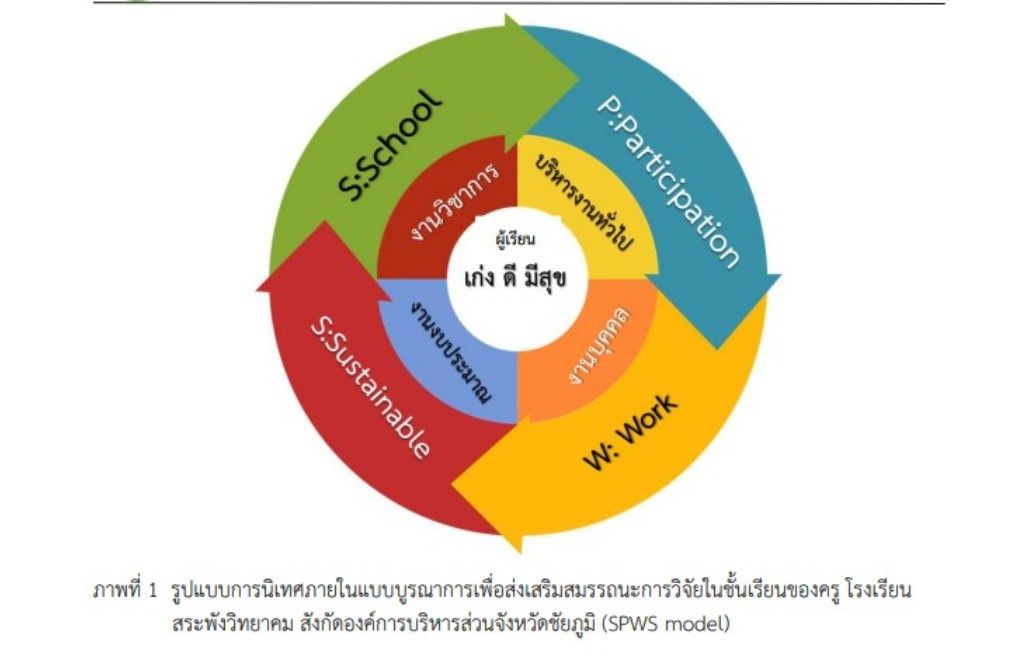การพัฒนารูปแบบการนิเทศภายในแบบบูรณาการเพื่อส่งเสริมสมรรถนะการวิจัยในชั้นเรียนของครูโรงเรียนสระพังวิทยาคม สังกัดองค์การบริหารส่วนจังหวัดชัยภูมิ
Main Article Content
บทคัดย่อ
การพัฒนารูปแบบการนิเทศภายในแบบบูรณาการเพื่อส่งเสริมสมรรถนะการวิจัยในชั้นเรียนของครู โรงเรียนสระพังวิทยาคม สังกัดองค์การบริหารส่วนจังหวัดชัยภูมิ มีวัตถุประสงค์ ดังนี้ 1) เพื่อศึกษาข้อมูลพื้นฐานและความต้องการจำเป็นการนิเทศภายในแบบบูรณาการ เพื่อส่งเสริมสมรรถนะการวิจัยในชั้นเรียนของครู โรงเรียนสระพังวิทยาคม สังกัดองค์การบริหารส่วนจังหวัดชัยภูชัยภูมิ 2) เพื่อออกแบบและการพัฒนารูปแบบการนิเทศภายในแบบบูรณาการ เพื่อส่งเสริมสมรรถนะการวิจัยในชั้นเรียนของครู โรงเรียนสระพังวิทยาคม สังกัดองค์การบริหารส่วนจังหวัดชัยภูมิ 3) เพื่อทดลองการใช้รูปแบบการนิเทศภายในแบบบูรณาการ เพื่อส่งเสริมสมรรถนะการวิจัยในชั้นเรียนของครู โรงเรียนสระพังวิทยาคม สังกัดองค์การบริหารส่วนจังหวัดชัยภูมิ 4) เพื่อประเมินผลและปรับปรุงรูปแบบการนิเทศภายในแบบบูรณาการ เพื่อส่งเสริมสมรรถนะการวิจัยในชั้นเรียนของครู โรงเรียนสระพังวิทยาคม สังกัดองค์การบริหารส่วนจังหวัดชัยภูมิ กลุ่มเป้าหมายที่ใช้ในการวิจัย 250 คน คือ ครูผู้สอนและนักเรียน จำแนกเป็นครูผู้นิเทศและครูผู้รับการนิเทศ จำนวน 23 คน และนักเรียนชั้นมัธยมศึกษาปีที่ 1 - 6 จำนวน 227 คน เครื่องมือที่ใช้ในการวิจัย ได้แก่ แบบวิเคราะห์เอกสาร แบบสัมภาษณ์แบบทดสอบ แบบสอบถาม แบบสังเกต และ ประเด็นสนทนากลุ่ม การวิเคราะห์ขอ้ มูลใช้ค่าร้อยละ ค่าเฉลี่ย ค่าส่วนเบี่ยงเบนมาตรฐาน ค่า Wilcoxon Signed Ranks Test ค่า t –test แบบ dependent และการวิเคราะห์เนื้อหา ผลวิจัยพบว่า 1) การพัฒนารูปแบบการนิเทศภายในแบบบูรณาการ เพื่อส่งเสริมสมรรถนะการวิจัยในชั้น เรียนของครู เอสพีดับบลิวเอส (SPWS Model) ประกอบด้วย หลักการมุ่งเน้นกระบวนการนิเทศที่เป็นระบบสัมพันธ์กันและคำนึงถึงความแตกต่างระหว่างบุคคล วัตถุประสงค์ เพื่อพัฒนาสมรรถนะการนิเทศและการทำวิจัยในชั้นเรียน กระบวนการนิเทศ 4 ขั้นตอน คือ ขั้นตอนที่1 Classifying: Cการคัดกรองระดับความรู้ความสามารถ ทักษะที่สำคัญเกี่ยวกับการจัดการเรียนรู้และการวิจัยในชั้นเรียน เพื่อจัดกลุ่มครูและเลือกวิธีการนิเทศที่เหมาะสมสำหรับครูแต่ละกลุ่มขั้นตอนที่ 2 Informing : I การให้ความรู้ก่อนการนิเทศ ขั้นตอนที่ 3 Proceeding : P การดำเนินงาน ได้แก่ 3.1 การประชุมก่อนการสังเกตการสอน (Pre conference) 3.2 การสังเกตการสอน (Observation) 3.3 การประชุมหลังการสังเกตการสอน (Post conference) ขั้นตอนที่ 4 Evaluating : E การประเมินผลการนิเทศโดยมีการกำกับติดตาม (Monitoring) อย่างต่อเนื่องทุกขั้นตอน และ2) ผลการใช้รูปแบบการนิเทศภายในแบบบูรณาการเพื่อส่งเสริมสมรรถนะการวิจัยในชั้นเรียน พบว่า ครูผู้นิเทศ มีสมรรถนะในการนิเทศภายในแบบบูรณาการ อยู่ในระดับ สูง และมีความรู้ความเข้าใจเกี่ยวกับการวิจัยในชั้นเรียนก่อนและหลังการใช้รูปแบบการนิเทศแตกต่างกันอย่ามีนัยสำคัญทางสถิติที่ระดับ .05 โดยหลังการใช้รูปแบบการนิเทศมีคะแนนเฉลี่ยสูงกว่าก่อนการใช้รูปแบบการนิเทศ ครูผู้รับการนิเทศมีความรู้ความเข้าใจเกี่ยวกับการนิเทศภายในแบบบูรณาการก่อนและหลังการใช้รูปแบบการนิเทศ แตกต่างกันอย่างมีนัยสำคัญทางสถิติที่ระดับ .05 โดยหลังการใช้รูปแบบการนิเทศมีคะแนนเฉลี่ยสูงกว่าก่อนการใช้รูปแบบการนิเทศ มีสมรรถนะการวิจัยในชั้นเรียนอยู่ในระดับ สูงมาก และมีความพึงพอใจต่อรูปแบบการนิเทศภายในแบบบูรณาการอยู่ในระดับ มากที่สุด และนักเรียนมีผลการเรียนรู้ก่อนและหลังการใช้รูปแบบการนิเทศภายในแบบบูรณาการ ของครูผู้รับการนิเทศ แตกต่างกันอย่างมีนัยสำคัญทางสถิติที่ระดับ .05 โดยหลังการใช้รูปแบบการนิเทศ นักเรียนมีผลการเรียนรู้ สูงกว่า ก่อนการใช้รูปแบบการนิเทศ
Article Details
เอกสารอ้างอิง
กัลยา พานิชวงษ์. (2547). การพัฒนาสมรรถภาพการวิจัยเชิงปฏิบัติการในชั้นเรียนของครูประถมศึกษาโดยใช้การนิเทศแบบร่วมมือกัน. วิทยานิพนธ์ (สาขาวิชาหลักสูตรและการนิเทศ) ภาควิชาหลักสูตรและวิธีสอน บัณฑิตวิทยาลัย มหาวิทยาลัยศิลปากร.
เก็จกนก เอื้อวงศ์. (2555). การนิเทศในสถานศึกษา. เข้าถึงได้จากhttp://mystou.files.wordpress.com/2012/02/23503_8_t.pdf. 16 พฤษภาคม 2563.
จรูญพร ลำไย. (2547). การนิเทศการสอนแบบเพื่อนนิเทศเพื่อนและการนิเทศโดยผู้บริหารเพื่อพัฒนาสมรรถภาพการทำวิจัยในชั้นเรียนของครูประถมศึกษา. วิทยานิพนธ์ปริญญาศึกษาศาสตรมหาบัณฑิต สาขาหลักสูตรและการนิเทศ บัณฑิตวิทยาลัย มหาวิทยาลัยศิลปากร.
เมธี ปิลันธนานนท์. (2552). การบริหารงานบุคคลในวงการศึกษา. (พิมพ์ครั้งที่ 2). กรุงเทพฯ: โอเดียนสโตร์.
ยุพิน ยืนยง. (2553). การพัฒนารูปแบบการนิเทศแบบหลากหลายวิธีการเพื่อส่งเสริมสมรรถภาพการวิจัยในชั้นเรียนของครู เขตการศึกษา 5 อัครสังฆมณฑล. กรุงเทพฯ. วิทยานิพนธ์ ปร.ด. นครปฐม: มหาวิทยาลัยศิลปากร.
เยาวพา เตชะคุปต์. (2542). การจัดการศึกษาสําหรับเด็กปฐมวัย. กรุงเทพฯ: แม็ค.
วัชรา เล่าเรียนดี. (2556). ศาสตร์การนิเทศการสอนและการโค้ช. (พิมพครั้งที่ 12). นครปฐม: โรงพิมพ์มหาวิทยาลัยศิลปากร วิทยาเขตพระราชวังสนามจันทร์ นครปฐม.
สํานักงานคณะกรรมการการศึกษาขั้นพื้นฐาน. (2553). คู่มือการประเมินสมรรถนะครู. กรุงเทพมหานคร: สํานักงานคณะกรรมการการศึกษาเอกชน.
สํานักงานคณะกรรมการการศึกษาขั้นพื้นฐาน. (2558). แนวทางการดําเนินงานพลิกโฉมการนิเทศเพื่อพัฒนาคุณภาพการศึกษา. กรุงเทพฯ: ศูนย์พัฒนาคุณภาพการศึกษาด้วยเทคโนโลยีการศึกษาทางไกล สํานักงานคณะกรรมการการศึกษาขั้นพื้นฐาน.
เสาวนี ตรีพุทธรัตน์. (2555). การนิเทศการศึกษาเบื้องต้น. ในเอกสารประกอบการสอน ภาควิชาการบริหารการศึกษา คณะศึกษาศาสตร์. ขอนแก่น: มหาวิทยาลัยขอนแก่น.
อรวรรณ เหมือนสุดใจ. (2545). การนิเทศเพื่อนเพื่อพัฒนาสมรรถภาพการวิจัยในชั้นเรียน สำหรับครูภาษาอังกฤษระดับมัธยมศึกษา. วิทยานิพนธ์ ศึกษาศาสตร มหาบัณฑิต สาขาหลักสูตรและการนิเทศ, มหาวิทยาลัยศิลปากร.
Wanzare, Z. and Da Costa, J. L. (2004). Rethinking instructional leadership roles of the school principal: Challenges and prospects. The Journal of Educational Thought, 35(3), 269-295.


